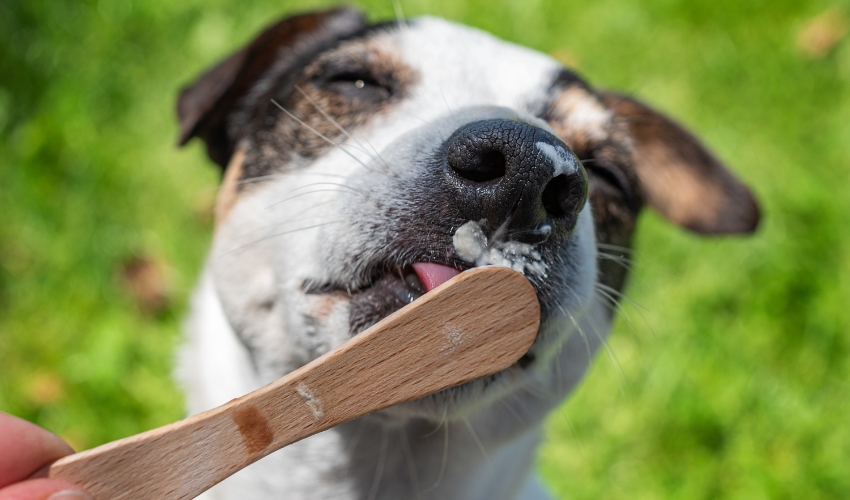Nuts are significantly beneficial to people because they can lower cholesterol, reduce inflammation, support weight loss, and give other health benefits. Unfortunately, the case is not the same for dogs because a few kinds of nuts can cause unwanted consequences, even lethal ones.
Nevertheless, if you want your pup to enjoy a nut snack with you, you can read this article to know several types of nuts dogs can safely eat.
Can Dogs Eat Nuts?
Dogs can periodically eat nuts, but note that most types can cause health risks or harm due to their fat content. Moreover, many pet owners consider them a common choking hazard, putting canines at stake after swallowing them without chewing.
While a few types of nuts lead dogs to suffer only mild symptoms, some are excessively toxic and can cause lethal consequences. Verily, even eating the wrong type can result in obesity and inflammation of the pancreas or pancreatitis. Some signs of these effects include lethargy, diarrhea, vomiting, and loss of appetite.
Aside from that, consuming dangerous types of nuts can cause water retention or trouble peeing. Canines can also have a hunched back when walking or a distended belly.
Therefore, in these cases, carefully picking each type of nut significantly affects your dog’s health and well-being. Not everything is toxic, but most are; thus, you must beware when feeding your pup with one. Here is a tip: nuts must be unseasoned and salt-free!
What Types Of Nuts Can Dogs Eat?
As stated above, not all nuts are toxic to dogs. You can still pick a few types your furry friend can enjoy without worrying about possible health dangers. So, with that said, here are the types of nuts dogs can safely eat!
1. Pistachios
Indeed, pistachios are one of the people’s favorite nuts. They often use them as a unique ingredient in cakes, ice creams, and other desserts. However, can dogs have pistachios?
Fortunately, canines can munch pistachios, given that pet owners will only give them in small quantities every once in a while. Otherwise, feeding in large amounts can lead to allergic reactions, gastrointestinal issues, and pancreatitis.
In addition, it is advisable to remove the shells of the pistachios before letting a dog chew on them. That is because these things can be an extra choking hazard that can cut their mouth or throat.
2. Pecans
Thanks to their non-toxic content, pecans are safe for dogs to consume, but only once in a blue moon. Although they rarely cause health risks, they can still lead to obesity because these nuts contain high-fat levels.
3. Cashew
Aside from pistachios being people’s favorite, cashews are also some of the most popular nuts. However, can dogs have cashews as humans do?
According to the American Kennel Club, dogs can eat cashews safely because they are non-toxic. Nevertheless, since they are high-fat, high-protein snacks, pet parents must only provide canines with these in small quantities. Also, they must be unsalted and unseasoned cashews.
4. Peanuts
Peanuts, specifically those plain and shelled ones, are safe for dogs. Since they are legumes like lentils and peas, they will be less likely to generate health dangers.
Additionally, if you are to give your dog any peanut butter, ensure that it has no xylitol or artificial sweeteners. That is because they are highly toxic and potentially lethal to canines.
5. Chestnuts
Chestnuts are healthy options if you want to feed your dog with nuts. They can help avoid constipation while giving an abundant source of vitamins B1, B2, and C, copper, potassium, and iron.
Nonetheless, chestnuts can still possess fat and carbs that can harm your pup’s digestive system once excessively eaten. Hence, they must consume them in small quantities and only when in plain, unseasoned flavors.
How Do Healthy Nuts Benefit Dogs?
If you still need to decide whether or not to give your dog nuts, here are some ways these delicious snacks benefit pets.
- Nuts can provide amino acids essential in producing nitric oxide for enhanced blood circulation.
- They can be an excellent source of fiber that can help aid constipation.
- They give out plenty of protein and vitamins to support the canines’ immune systems.
- Nuts can also bring vitamins B1 and B2 that can assist in countering fatigue and stimulating appetite.
- They supply healthy fats, potassium, copper, and iron.
- Some types, such as peanuts, can help reduce dogs’ high blood pressure.
What Types Of Nuts Are Dangerous To Dogs?

In contrast to the healthy nuts given earlier, the following are nuts you must never provide your furry friend. Aside from they can cause obesity and pancreatitis, they can also trigger allergic reactions, be toxic, or lead to lethal outcomes.
1. Brazil Nuts
Veterinarians do not advise Brazil nuts because they contain an extremely high-fat content. They can also be excessively dangerous to smaller breeds because they can get choked on these snacks and further harm their digestive systems.
2. Macadamia Nuts
Considering all types of nuts, Macadamia tops the list of the most toxic ones. Once a dog swallows or eats them, it may suffer from weakness, tremors, joint inflammation, and paralysis. So, if such instances happen, call a veterinarian immediately to prevent more severe consequences.
3. Walnuts
Due to their large and irregular shapes, walnuts can be risky if dogs will consume them. They can be a significant digestive block and choking hazard.
Furthermore, black walnuts are toxic to canines, leading to vomiting, seizures, muscle weakness, and high temperatures. Since this type of walnut is also not commonly eaten by people, pet owners must likewise avoid giving them to pets.
Conclusion
As a pet owner, knowing the types of nuts dogs can safely eat can crucially prevent toxicity, obesity, allergies, and other health risks. Luckily, this article has provided you with things you need to know about this problem.
If you know someone struggling with the same conflict, you can voluntarily help them solve it. You can also be with Doobert, as this team assists many pet owners in handling situations with their pets. You can also adopt and save numerous lives of precious animals.











